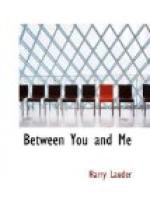That was a grand occasion, I’m tellin’ ye. It was in the Metropolitan Opera Hoose, that great theatre where Caruso and Melba and a’ the stars of the opera ha’ sung sae often. Aye, Harry Lauder had sung there tae—sung there that nicht! The hoose was fu’, and I made my talk.
And then I held up my book, “A Minstrel in France.” I asked that they should buy a copy. The bidding started low. But up and up it ran. And when I knocked it doon at last it was for twenty-five hundred dollars —five hundred poonds! But that wasna a’. I was weel content. But the gentleman that bocht it lookit at it, and then sent it back, and tauld me to auction it all ower again. I did, and this time, again, it went for twenty-five hundred dollars. So there was five thousand dollars—a thousand poonds—for ma wounded laddies at hame in Scotland.
Noo, think o’ the contrast. There’s a toon—I’ll no be writing doon its name—where they wadna bid but twelve dollars—aboot twa poond ten shillings—for the book! Could ye blame me for being vexed? Maybe I said more than I should, but I dinna think so. I’m thinking still those folk were mean. But I was interested enough to look to see what that toon had done, later, and I found oot that its patriotism must ha’ been awakened soon after, for it bocht its share and more o’ bonds, and it gave its siller freely to all the bodies that needed money for war work. They were sair angry at old Harry Lauder that nicht he tauld them what he thocht of their generosity, but it maybe he did them gude, for a’ that!
I’d be a dead man the noo, e’en had I as many lives as a dozen nine lived cats, had a’ the threats that were made against me in America been carried oot. They’d tell me, in one toon after anither, that it wadna be safe tae mak’ ma talk against the Hun. But I was never frightened. You know the old saying that threatened men live longest, and I’m a believer in that. And, as it was, the towns where there were most people of German blood were most cordial to me.
I ken fine how it was that that was so. All Germans are not Huns. And in America the decent Germans, the ones who were as filled with horror when the Lusitania was sunk as were any other decent bodies, were anxious to do all they could to show that they stood with the land of their adoption.
I visited many an American army camp. I’ve sung for the American soldiers, as well as the British, in America, and in France as well. And I’ve never seen an American regiment yet that did not have on its muster rolls many and many a German name. They did well, those American laddies wi’ the German names. They were heroes like the rest.
It’s a strange thing, the way it fell to ma lot tae speak sae much as I did during the war. I canna quite believe yet that I was as usefu’ as my friends ha’ told me I was. Yet they’ve come near to making me believe it. They’ve clapped a Sir before my name to prove they think so, and I’ve had the thanks of generals and ministers and state. It’s a comfort to me to think it’s so. It was a sair grief tae me that when my boy was dead I couldna tak’ his place. But they a’ told me I’d be wasted i’ the trenches.




